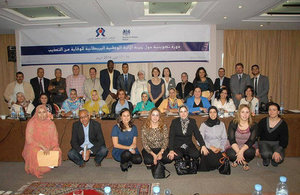UK works with Morocco on final steps of OPCAT ratification
Two UK experts visit Morocco to share with CNDH their experience in running the National Preventive Mechanism (NPV), the independent body for investigating allegations of torture.

The British Embassy in Morocco, together with the Moroccan National Human Rights Council (CNDH), held an experience-sharing workshop in Rabat on 16-17 October on the UK’s National Preventive Mechanism, the independent body that is able to investigate allegations of torture and carry out prison visits in order to support a country’s ratification of the Optional Protocol to the Convention Against Torture, known as OPCAT. More than 30 CNDH members and staff from all over regions of Morocco, including from the South, attended the training
Speaking at the opening of this workshop, Smita Rossetti, Deputy Head of Mission of the British Embassy in Rabat, congratulated the CNDH on the efforts it has already made in monitoring the rights of detainees in Morocco and the role it has played in shaping the Kingdom’s legislation. Ms. Rossetti said “Morocco will be the second country in the Arab World, after Tunisia, to have validated its ratification of OPCAT once it deposits its instrument with the UN. To do this Morocco must establish its own National Preventive Mechanism. The United Kingdom was among the first states to officially set up a National Preventive Mechanism and we are delighted to be playing a part now in Morocco’s process.”
The UK supports the global ratification and implementation of the Convention Against Torture and its Optional Protocol, known as OPCAT, which ensures that places of detention are inspected and monitored.
The CNDH invited two UK experts, Louise Finer, the senior policy officer at Her Majesty’s Inspectorate of Prisons (HMIP) and overall coordinator of the Mechanism’s activities, and Kellie Reeve, one of UK senior Prisons Inspectors. Louise and Kellie shared HMIP’s experience in coordinating 19 NMPs, inspecting prisons, police and court custody, immigration and military detention facilities and making recommendations to government based on their findings.